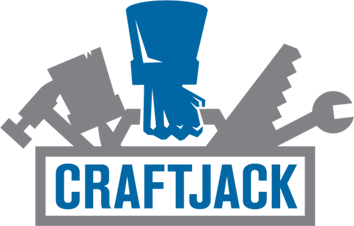How To Franchise Your Business
Expand the reach of your business and make more money by becoming a franchisor. Find out how to franchise a small business, including advice on formats, business models, licensing, and disclosure documents.

If you're looking to expand your business to new locations without being on the front line of each operation, consider franchising. Provided you do sufficient research and give franchisees the tools necessary for maintaining brand consistency, you can make a great success of your franchise. Read on to discover how to franchise a small business, from conception through to completion.
If you're planning on franchising your service business, CraftJack is here to help you expand successfully. Sign up today for more leads in your area.
What Is A Franchise?
A franchise is an entity that allows business owners to expand their companies to new locations without being on the front line. By turning your operation into a franchise, you give franchisees the opportunity to buy the rights to your business's branding, business practices, and trademarks.
Franchising is popular in the United States, with 759,000 unique franchises recorded as being in operation in 2018. Franchisors don't just get an up-front fee from the person or group purchasing the franchise; they also get paid monthly royalty fees.
Franchisees benefit from your expertise as an entrepreneur by entering into a business operation where the name and branding are already set. What's more, they don't have to create documents to define company culture, instill best practices, or develop a market share. As such, they should be hardworking professionals with a proven track record of success in running an operation day-to-day.
Benefits Of Franchising A Business
The main reason franchising appeals to so many business owners is that it delivers increased brand recognition and maximizes revenue. You get to capitalize on your hard work creating an effective brand and tightly run operation without any of the ground work. A franchise allows you to expand faster and obtain recognition across more territories.
As well as benefiting from fast-tracked expansion, you enjoy a consistent stream of royalties that reflect the level of success of your franchise. By ensuring the branding and operating manual are watertight, easy to understand, and transferable, you can guarantee the success of your franchise venture.
Provided you learn how to franchise a small business correctly and choose diligent, untiring franchisees, both parties can reap significant rewards.
Drawbacks Of Franchising A Small Business
While franchising a service business has plenty to offer, there can be drawbacks if the arrangement isn't the right fit. Let's take a look at some of the disadvantages of franchising a business.
Costs
Establishing a franchise network can be costly and takes time. You'll need to calculate how quickly you can recover your initial investment and decide whether you can afford to become a franchisor.
Finding Qualified Franchisees
While you might be tempted to accept the first attractive offer that comes along, this can be counterintuitive for success. While the franchisee must have the necessary funds to make an investment in your business, their work ethic and potential to succeed are equally important.
Rushing the recruitment process or overlooking red flags could irreparably damage your reputation and result in failure across the entire network. Finding the right people with the motivation, money, and ability to adopt your company culture is challenging. However, a successful franchise is well worth the effort.
Loss Of Creative Control
Keep in mind that you're working with a businessperson as opposed to an employee and you won't be present, so a certain amount of control is automatically lost. However, you can mitigate this by developing an extensive operating manual that ensures your franchise is run exactly as you would yourself.
Maintain regular contact with the franchisee to ensure that operational procedures are being followed and all the necessary systems are in place. By keeping a close eye on KPIs, you can quickly spot areas of poor performance and act quickly to improve them.
Potential For Conflict
The potential for conflict and litigation is ever-present for franchisors and franchisees. When everyone's making money, it's unlikely conflict will arise. If this isn't the case, the franchisee can easily blame the franchisor for not offering enough support, training, or quality operational documents.
Is Franchising Right For You?
Franchising can be a life-changing decision and highly lucrative if your business is positioned correctly. Here are some of the features that contribute to a successful brand for franchising:
- Your concept should have a proven track record, with acclaim from the public and the press.
- Franchising shouldn't be deployed as a tool to try to save an ailing business. The company should be successful and profitable.
- Your business should be unique and sustainable with a competitive advantage that allows it to succeed in multiple territories.
- All skills, expertise, procedures, and systems must be transferable.
- Operating systems and processes and procedures should be in a manual or series of manuals so that you can train beginners to become experts within three months.
- You must be in a position to perform regular health checks and offer consistent support.
- Make sure your franchise isn't positioned at such a high price bracket that hardly anyone can afford it.

How To Franchise A Small Business
Turning a business into a franchise varies a lot. For example, franchising a service business is distinct from franchising in retail or hospitality. Nonetheless, there are some steps any business owner must take to make the plunge and become a franchisor.
Step One: Research
You should have your target audience, branding and operational manuals locked in already, but it's important that you learn as much as possible about franchising. Below are some key concepts to look into.
Franchise Agreement
Your franchise agreement is a document that outlines the shared intentions of the franchisor and franchisee. It shouldn't be conditional on the franchise location and should be a legally sound contract. You should also negotiate aspects such as credit, territory, and other items that are specific to the franchisee in this agreement.
Franchise Fees
The majority of businesses require that franchisees pay a fee. This usually consists of an initial up-front fee, with additional ongoing monthly fees. The average franchise fee ranges from $25,000 to $50,000 per unit. Royalties tend to be based on a percentage of monthly revenue.
Franchise Disclosure Document
An FDD is the document that gives franchisees all the necessary information about your operation, including sales figures and other vital details. You should update this document on an annual basis to outline the Federal Trade Commission's requirements.
It's never a good idea to jump into franchising without sorting all the legal requirements first. While franchising is generally a costly endeavor, liabilities can be glaring if your operation isn't compliant from a legal standpoint.
Step Two: Development
It's essential that you create a specific business plan for franchising your business. You should explore structure, create a profile of your ideal franchisee, and work out which territories you plan to allocate to franchisees. Staffing and support for the franchisee are also key considerations.
Let's take a look at some questions that can help you create a realistic plan:
- What potential problems could the franchise run into?
- How will you define your role?
- Exactly what is the franchisee responsible for?
- What will the franchisee package look like?
An extensive financial analysis is essential, with realistic best- and worst-case projections of how your business and the franchisee's business will perform. You should consider management service fees, cost profiles, and profit margins and think carefully about how sales are set to build over time.
Step Three: Pilot
With the majority of businesses failing within five years, it's crucial that you make sure your operation is viable and sustainable before franchising. A pilot operation should run for at least a year to ensure it's got what it takes to succeed long term. This way, you can pass on all the lessons you learn from teething problems and prevent franchisees from making the same mistakes.
Step Four: Operations
An operational manual is nonnegotiable. You'll need to put in place a highly detailed document that outlines the entire business operation and all best practices therein. You can use it as a training tool for franchisees and they can use it as a reference tool, a foundation for business development, and a resource for training employees.
Brand consistency is one of the most important aspects of a franchise. The terms, conditions, and directions contained within should provide everything necessary to achieve uniformity across the franchise network.
Step Five: Recruit And Screen
Now that you've spent resources on developing a transferable system, it's time to recoup your investment. This is the most critical time for any franchisor, and rushing the recruitment process could be irreparably damaging. Plan the recruitment drive carefully and make sure you've perfected your interviewing technique and questions.
Step Six: Support
With a hard-working, detail-oriented franchisee at the helm, you're ready to open your franchise! Don't be lulled into thinking that you're now finished with this operation and free to move onto the next venture. All successful franchises are run by franchisors who meticulously analyze the operation and offer the right levels of support.
Your operational manual, brand guidelines, and initial training should be top rate. But the ongoing support you offer is just as vital. Too much and you risk the franchisee becoming dependent; not enough and the franchise will deviate from your plan. If all procedures and processes are streamlined and easy to understand, you're in a great position to oversee a successful franchise.



